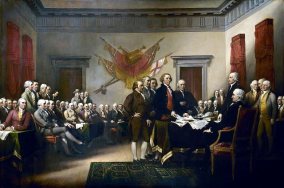Betteridge’s law of headlines states whenever a question is asked in a headline, the answer is generally ‘no’. It’s named after Ian Betteridge, a British technology journalist. The concept is much older. It has also been called “Davis’ law” or just the “journalistic principle.” My response to this titled post would be, ‘yes’.
I decided to post this as a 3 part commentary in response to a few back and forth friendly postings on Facebook. The person I’m primarily writing this to will instantly recognize this if he should read it here. I don’t pretend to be an expert on history or world affairs, however I do study past and present events and draw my own conclusions.
If you read these posts, I invite anyone to comment so long as it’s civil and reasonably well thought out. I’m going to create two separate posts today because of their length. There will be a third post in the following day or two ahead. You may or may not choose to read them all at once. I intend to summarize a vast history of primarily the U.S. contrasted to other nation – states. The underlined links and most of the photos have related articles or video which give further helpful background. The purpose is to attempt to help myself and others realize what occurs today have been observed before. Specific people and technology may change but the overall arc of humanity remains the same.
RESPONSE PART I
John Adams, writing to Mercy Otis Warren in 1776, agreed with classical Greek and Roman thinkers in that “Public Virtue cannot exist without private, and public Virtue is the only Foundation of Republics.”

John Trumbull’s painting, Declaration of Independence showing 5 members presenting draft to Congress
The foundation of the U.S. as a federal republic through its Constitution was well constructed but like all written documents, subject to interpretation. This has resulted in numerous clashes between those in control vs. those without recognition or power.
A government is only appropriate and effective when it respects the fundamental rights of all its citizens. This is where the United States has fallen short in its promise of treating all equally under the law. Furthermore, the collective efforts of those that served to roll back tyranny in other areas of the world found out when they came home their personal liberty was still not assured. Over time this has evolved but as long as humans are in charge of others, it’s difficult for anyone in control to limit or cede their power.
It’s all about managing the affairs of state within the realm of reason and proper stewardship. There are always people who complain the conditions in which they live are not of their own choosing and want to shift that burden to others. There are instances this is true but It has become obvious to many this burden has shifted to fewer people as the public trough has become a way to assure more votes. This action has consequences for the caretaker and the ward of the state.
Eventually those who pay for those who play, don’t see an advantage in working hard because they understand more of their time is confiscated by bureaucrats and redistributed to the masses to keep themselves in office. This is why the economies of countries under a socialistic model fail to be productive and long-lasting. Dictatorships simply extend the life of socialism by enforcing powerful governmental control over the natural evolution of an economy to a free market.
Going back to the explanation given by John Adams, private integrity matters. This is where I cringe when many people suggest what a politician does in their private life has no real impact in their public duties. I find when people lie or cheat on their closest alliance(s), they will do so without qualm in their ‘sworn duties’ as well.
Related Links
• DHS checkpoints
• Our Nation Under Mob Rules
• Bradley Manning and the Two Americas

John Adams (Photo credit: Wikipedia)
John Adams was an opinionated intellectual of his day. He probably could have given Jon Stewart a lesson or two in put downs.
“That Washington is not a scholar is certain. That he is too illiterate, unlearned, unread for his station is equally beyond dispute.”
On Thomas Paine’s Common Sense
“What a poor, ignorant, malicious, crapulous mass.”
